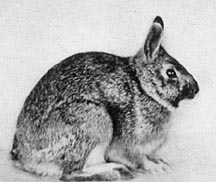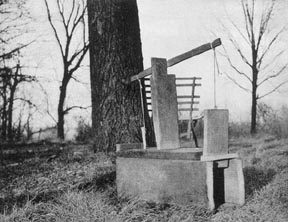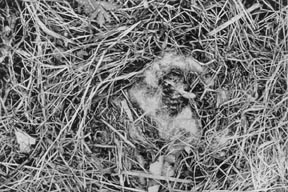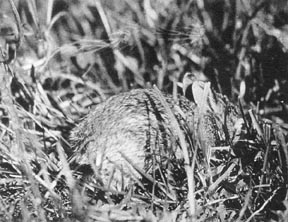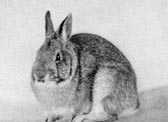BUNNY COTTONTAIL
page 165 “Look out, papa, and see who’s here.” Three full-grown rabbits playing on the lawn were what papa saw. Back and forth, round and round they ran like children playing tag. Sometimes One would jump high into the air and kick up his heels. They cut up all kinds of antics, for all the world like a lot of schoolboys. The rabbitshad come to feel very secure in the blackberry thicket behind the apiary, and would come out to play in the morning or evening, and sometimes in the middle of the day. There were dozens of them living in the orchard and the little wood. In summer they were the delight of the whole family, although they did eat most of the peas planted in the garden, but in winter they were the despair of the Naturalist, because, try as he would, he could not prevent them from girdling his young fruit trees, cutting off the tender shoots of his shrubbery, and barking his blackberry bushes. Every winter the trouble increased, since the number of rabbits had multiplied surprisingly. Only once did the Naturalist lose patience and permit two hunters to spend a half day hunting rabbits. They were instructed that no matter what else they saw they must not shoot. Birds, squirrels, even skunks must be protected, but the rabbits were getting too thick. As a result of their few hours’ shoot they two men killed sixty rabbits. In spite of his damaged shrubs the Naturalist felt very guilty, and could not quite bring himself to permit the shooting to be repeated, although he never could see that there were any less rabbits than there were before. The animals multiply so rapidly in a protected area that they soon became a real problem. If it had not been for the fact that the polecat family sometimes dined on rabbit, they would have overrun the place.
In spite of their mischief the Naturalist and all his family loved the little animals, and never tired of watching their play. Baby Ruth watched them with delight and would call “Bunny Rabbit,” “There’s Bunny Rabbit.”
The rabbit is a timid and defenseless animal, and a harassed life is his. With his numerous enemies his life is constantly in peril. Hunters and dogs constantly seek his life by day, and if, perchance, no other danger is nigh, the big red-tail hawk swoops down from the open sky intending to make a meal of him. By night the big horned owl flies stealthily overhead, and is likely to catch Bunny unawares. If he rests quietly in a warm corner of a hollow log, or even in his grassy form, Mother Polecat is quite likely to happen along and slay him without mercy. Besides all these dangers which require constant vigilance on Bunny’s part, the small boy sets an innocent-looking trap, which, if he enters in search of shelter, is immediately sprung, and Mr. Cottontail finds himself a prisoner, with a fine chance that he will be served for somebody’s dinner. Bunny is not a suspicious fellow, and if the trap shows evidence of having been occupied by rabbits previously, he enters without hesitation. Knowing this, the small boy will take a rabbit caught in an old trap and confine it for a time in his new trap, before setting it. If the weather is fine, Bunny prefers to remain outside, and the traps are of little use to the boys who set them with so much care. When the weather is very cold and stormy, and there is greater need of shelter, Bunny enters the trap, and backing into the farther end, springs the trigger, and lo! he is caught at last.
In mild weather, be it winter or summer, all that the rabbit asks in the way of shelter is a thick bunch of grass that will furnish him a hiding place. Here he makes a nice form which looks somewhat like a nest, and sits quietly resting until all is quiet and he feels that it is safe to go abroad in search of his dinner.
The polecat moves so slowly that his only chance to catch Bunny is to take him by surprise. The big birds which seek his life also approach quietly, and catch him before he knows that danger is present. Coyotes, foxes, and dogs may take a chance on overtaking him with a straight race, but Bunny is very clever and has learned many tricks to throw them off the scent. The Naturalist would sometimes climb high in a tree, when, on a winter day, he heard the bark of dogs that told that they were following swiftly on Bunny’s track. When the leaves had fallen he could see what was going on below for some distance around.
When a dog would frighten Bunny from his hiding place he would scamper away as fast as he could run, with the dog barking at his heels. The little wood had grown up very thick, and there was much underbrush, so that Bunny could take sharp turns that were hard for the dog to follow. Usually the dog would soon find it necessary to follow the scent and depend upon his nose, rather than his eyes. As soon as the rabbit had a safe lead, he would begin running in circles, then in double circles or figure eights, frequently coming back to the same point. Nearly always this would be too much for the dog, as he could not unravel the maze of mystery, and he would run round and round over the same tracks which he had already followed. After making a few such puzzling trails to occupy the dog, Bunny would run straight away as fast as he could go for the blackberry thicket near the Naturalist’s house, for dogs were not permitted to trouble him there.
Laboratory scientists who have used white rabbits in confinement to study their reasoning powers, have found them very stupid animals.
Out-of-door naturalists, who have watched them in the open and admired the many tricks which they use to avoid their numerous enemies, have found them to be very clever indeed. The laboratory naturalist will say that all animal mental processes are instinctive, and that there is no understanding of the objects sought, or deliberation as to methods to be employed. The out-of-door naturalist, on the other hand, will say that the manifestation of ability to devise means to accomplish ends is evidence of some degree of reasoning power, and this the rabbit seems able to do.
Since her offspring are born helpless and blind, Mother Cottontail depends upon her skill in hiding them to keep them from danger. She makes a little hollow in the earth, not much larger than a robin’s nest, and lines it with her own fur. In this
warm nest she places her young and covers them very cleverly. Even when the Naturalist knew the location of her nest, he had to look very closely to find it, for there was no outward indication of its presence. She would cover it with grass or leaves exactly like the surroundings, and although there were dozens of them about, it was only rarely that the Naturalist or his boys were able to find one, unless it was turned out by the plow. If, perchance, they did find one, and carefully turn back the leaves, there were the young rabbits in the snug little nest. On such occasions they were not long permitted to know the rabbit’s secret, for if the babies were very young, their mother would soon move them to a new place; and if their eyes were open and they could run, they were likely to skip out and depend upon their ability to hide rather than to remain in a nest whose location was known, even to a friendly naturalist. After they leave the nest they still receive their mother’s care, although her brood is scattered quickly. While the mother is very timid, she will respond to the cry of her distressed young. If, however, it has fallen into the hands of a man or the jaws of a dog, she realizes that discretion is the better part of valor and seeks her own safety.
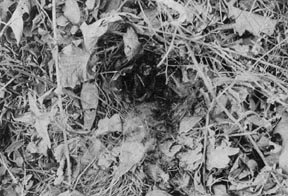
At time rabbits fight each other desperately, and the Naturalist knew cases where they even chewed each other’s ears off, though the fighting animals were in confinement, where the unfortunate which was getting the worst of it could not escape from her antagonist. In the open the trouble is not likely to be so long continued, for there is always the alternative of flight.
Since the rabbit has no means of defense, it always seems to be on the watch for danger, ready to be off with the slightest alarm. The long ears are sensitive to the slightest sound, and Bunny takes no chances when his suspicions are aroused. He always prefers to take his chances in the woods or the open field, rather that to trust to a hole in the ground or a hollow tree. It is only when very hard pressed, and there seems no other chance of escape, that he will take to such a shelter to escape an enemy.
Next Chapter
Book Contents
Return to Bob' Page
